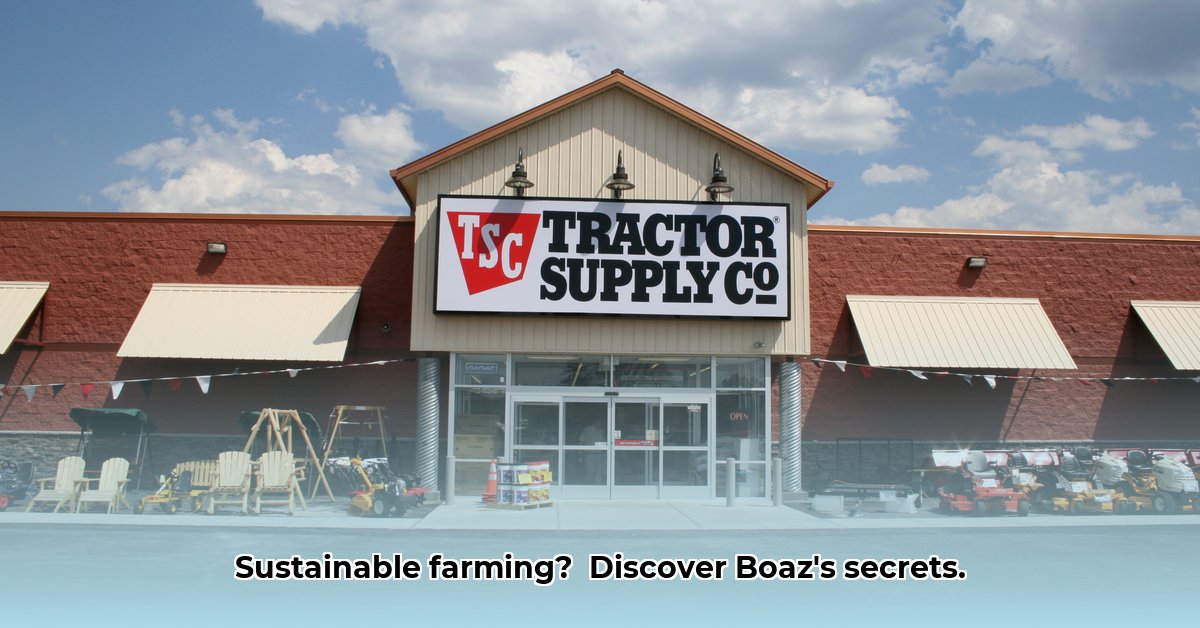
Boaz Tractor Supply (BTS), a local branch of Tractor Supply Company (TSC), presents a mixed bag regarding its contribution to sustainable agriculture. While offering a wide range of products potentially supporting eco-conscious farming, a lack of transparency regarding sourcing and environmental practices hinders a complete assessment of its impact. This article analyzes BTS's role, highlighting actionable steps for improvement and navigating the complexities of sustainable farming in the Boaz area. For more information on farm equipment, check out this helpful resource: Tractor Supply Disk Harrow.
Boaz Tractor Supply: A Closer Look at Its Role in Sustainable Farming
BTS's strategic location near recreational areas and surrounding smaller towns uniquely positions it to influence sustainable practices across the region. Partnerships promoting sustainable land management and community gardening initiatives could significantly amplify its positive impact. However, the absence of detailed public information on sourcing and environmental commitments limits its currently demonstrable contribution to sustainable agriculture. How can we quantify the actual environmental footprint of their product offerings?
Practical Steps Toward a Greener Future for Boaz Tractor Supply
To maximize its potential for promoting sustainable agriculture, BTS should prioritize the following actionable steps:
Short-Term Goals (Within the Next Year):
Comprehensive Supply Chain Audit: Conduct a thorough review of the entire supply chain to identify areas for improvement in sustainability, tracing products to their origins and evaluating manufacturing processes and packaging. This should aim for a 95% reduction in identified sustainability gaps within one year.
Sustainable Farming Workshops: Collaborate with local agricultural experts to organize workshops, teaching sustainable techniques like water conservation and reduced pesticide use. Target attendance of at least 50 local farmers within six months.
Community Garden Initiatives: Launch a community garden project in partnership with schools and organizations, creating a visible demonstration of environmental stewardship and community engagement. Aim for 100 community participants within the first year.
Eco-Friendly Product Partnerships: Actively seek partnerships with suppliers offering organic fertilizers, biodegradable packaging, and recycled-material tools. Increase the proportion of sustainably sourced products by 20% within one year.
Long-Term Goals (Over the Next 3-5 Years):
Holistic Sustainability Program: Develop a comprehensive program addressing all aspects of operations – sourcing, manufacturing, packaging, waste management, and energy consumption – with concrete, measurable goals and regular reporting. Full implementation within three years, with quarterly progress reports.
Policy Advocacy: Collaborate with local farmers to advocate for policies supporting sustainable agriculture at local and state levels. Develop and submit at least two policy proposals within two years.
Environmental Education: Partner with local schools to integrate environmental education into curricula. Engage at least three schools within the next two years.
Independent Environmental Monitoring: Invite independent environmental groups to regularly evaluate the environmental impact of BTS's operations to ensure accountability and transparency. Initiate annual independent audits within one year.
Potential Challenges and Solutions: Navigating the Uncertainties
Addressing potential challenges is crucial for BTS's sustainable growth. The table below highlights key risks and mitigation strategies:
| Risk Factor | Likelihood | Impact | Mitigation Strategy |
|---|---|---|---|
| Lack of Sourcing Transparency | High | High | Publicly accessible sustainability reports detailing product origins and supplier practices. |
| Inefficient Waste Management | Moderate | Moderate | Invest in comprehensive recycling and composting programs; explore reusable packaging options. |
| Limited Community Engagement | Low | Low | Proactive outreach to community groups, schools, and organizations for collaborative projects. |
| Dependence on Unsustainable Inputs | High | High | Prioritize suppliers already committed to sustainable and ethical practices. |
How to Source Sustainable Farming Supplies from Tractor Supply in Boaz, AL
Finding sustainable supplies at BTS requires diligence and proactive engagement:
Research Before You Go: Utilize TSC's online resources to identify products with sustainability certifications or descriptions.
Ask Questions: Directly engage with BTS staff to inquire about the environmental impact of products.
Consider Alternatives: Explore local farmers' markets or cooperatives if BTS lacks specific sustainable products.
Advocate for Change: Provide feedback to BTS, highlighting the demand for more sustainable options.
By actively participating in these initiatives, consumers can drive positive change within their local communities and support the growth of sustainable agriculture.